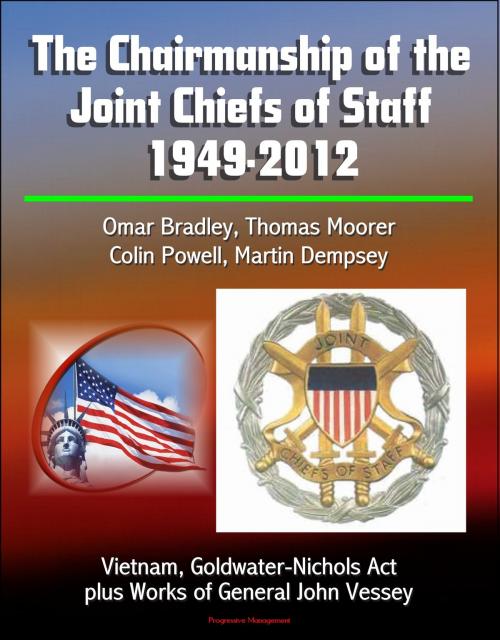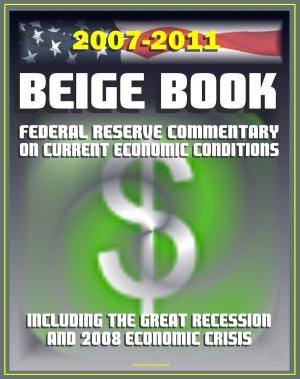The Chairmanship of the Joint Chiefs of Staff: 1949-2012, Omar Bradley, Thomas Moorer, Colin Powell, Martin Dempsey, Vietnam, Goldwater-Nichols Act, plus Works of General John Vessey
Nonfiction, History, Military, United States| Author: | Progressive Management | ISBN: | 9781311976680 |
| Publisher: | Progressive Management | Publication: | November 8, 2013 |
| Imprint: | Smashwords Edition | Language: | English |
| Author: | Progressive Management |
| ISBN: | 9781311976680 |
| Publisher: | Progressive Management |
| Publication: | November 8, 2013 |
| Imprint: | Smashwords Edition |
| Language: | English |
The Chairman of the Joint Chiefs of Staff is the nation's highest-ranking military officer. He presides over the Joint Chiefs of Staff and provides military advice to the civilian leadership. Soon after the Joint Chiefs of Staff came into existence during World War II, Admiral William D. Leahy became its presiding officer. This arrangement continued after the war, with General of the Army Dwight D. Eisenhower serving briefly after Leahy's departure in early 1949. When the National Security Act of 1947 gave legal sanction to the Joint Chiefs of Staff, it did not authorize a chairman. However, service disagreements over roles, missions, and the allocation of funds to meet the growing threat from the Soviet Union led Congress to create the position of Chairman of the Joint Chiefs of Staff in 1949. General Omar N. Bradley, USA, became the first Chairman on 16 August of that year. Although law, executive action, and practice extended the Chairman's role during three subsequent decades, his authority remained restricted and he served essentially as the first among equals on the JCS. In 1986, however, believing that the JCS system required fundamental reform, Congress enacted the Goldwater-Nichols Department of Defense Reorganization Act, which greatly expanded the Chairman's authority and responsibilities.
The Role of the Chairman * World War II: Chief of Staff to the Commander in Chief * Postwar Reorganization and a Temporary Appointment * Creation of the Position of Chairman * The First Chairman * The Eisenhower Chairmen: Advocates and Exemplars * The 1960s: Civilian Encroachment * The 1970s: Dealing with the Impact of Vietnam * The Road to JCS Reform * The Goldwater-Nichols Act * Principal Military Adviser * Expanded Influence * The Vice Chairman's Role * Into the 21st Century * Conclusion * The Chairmen * Omar Nelson Bradley * Arthur William Radford * Nathan Farragut Twining * Lyman Louis Lemnitzer * Maxwell Davenport Taylor * Earle Gilmore Wheeler * Thomas Hinman Moorer * George Scratchley Brown * David Charles Jones * John William Vessey, Jr. * William James Crowe, Jr. * Colin Luther Powell * John Malchase David Shalikashvili * Henry Hugh Shelton * Richard Bowman Myers * Peter Pace * Michael Glenn Mullen * Martin Edward Dempsey * The Vice Chairmen * Robert Tralles Herres * David Elmer Jeremiah * William Arthur Owens * Joseph Ralston * Richard Bowman Myers * Peter Pace * Edmund Peter Giambastiani, Jr. * James Edward Cartwright * James Alexander Winnefeld, Jr. * The JCS Conference Room: "The Tank" * The Flag of the Chairman of the Joint Chiefs of Staff * The Joint Chiefs of Staff Identification Badge * Quarters Six: The Chairman's Residence * Appendices * 1. Extracts of Public Law 81-216, National Security Act Amendments of 1949, 10 August 1949 * 2. Extracts of Public Law 99-433, Goldwater-Nichols Department of Defense Reorganization Act of 1986, 1 October 1986 * 3. Chronological Listing of Presidents of the United States, Secretaries of Defense, and Chairmen of the Joint Chiefs of Staff
Bonus: The Selected Works of General John W. Vessey, Jr., USA - Tenth Chairman of the Joint Chiefs of Staff - This book presents material drawn from the public record of General John W. Vessey's service—22 June 1982 through 30 September 1985—as the Tenth Chairman of the Joint Chiefs of Staff. Arranged in chronological order, the material is drawn from his speeches, Congressional testimony, published articles, selected correspondence and interviews. It reflects General Vessey's work to rebuild and upgrade the armed forces of the United States. Of particular interest are his efforts to improve the quality of the Joint Staff and his emphasis upon the importance of the unified and specified commands which foreshadowed important provisions of the Goldwater-Nichols Department of Defense Reorganization Act of 1986.
The Chairman of the Joint Chiefs of Staff is the nation's highest-ranking military officer. He presides over the Joint Chiefs of Staff and provides military advice to the civilian leadership. Soon after the Joint Chiefs of Staff came into existence during World War II, Admiral William D. Leahy became its presiding officer. This arrangement continued after the war, with General of the Army Dwight D. Eisenhower serving briefly after Leahy's departure in early 1949. When the National Security Act of 1947 gave legal sanction to the Joint Chiefs of Staff, it did not authorize a chairman. However, service disagreements over roles, missions, and the allocation of funds to meet the growing threat from the Soviet Union led Congress to create the position of Chairman of the Joint Chiefs of Staff in 1949. General Omar N. Bradley, USA, became the first Chairman on 16 August of that year. Although law, executive action, and practice extended the Chairman's role during three subsequent decades, his authority remained restricted and he served essentially as the first among equals on the JCS. In 1986, however, believing that the JCS system required fundamental reform, Congress enacted the Goldwater-Nichols Department of Defense Reorganization Act, which greatly expanded the Chairman's authority and responsibilities.
The Role of the Chairman * World War II: Chief of Staff to the Commander in Chief * Postwar Reorganization and a Temporary Appointment * Creation of the Position of Chairman * The First Chairman * The Eisenhower Chairmen: Advocates and Exemplars * The 1960s: Civilian Encroachment * The 1970s: Dealing with the Impact of Vietnam * The Road to JCS Reform * The Goldwater-Nichols Act * Principal Military Adviser * Expanded Influence * The Vice Chairman's Role * Into the 21st Century * Conclusion * The Chairmen * Omar Nelson Bradley * Arthur William Radford * Nathan Farragut Twining * Lyman Louis Lemnitzer * Maxwell Davenport Taylor * Earle Gilmore Wheeler * Thomas Hinman Moorer * George Scratchley Brown * David Charles Jones * John William Vessey, Jr. * William James Crowe, Jr. * Colin Luther Powell * John Malchase David Shalikashvili * Henry Hugh Shelton * Richard Bowman Myers * Peter Pace * Michael Glenn Mullen * Martin Edward Dempsey * The Vice Chairmen * Robert Tralles Herres * David Elmer Jeremiah * William Arthur Owens * Joseph Ralston * Richard Bowman Myers * Peter Pace * Edmund Peter Giambastiani, Jr. * James Edward Cartwright * James Alexander Winnefeld, Jr. * The JCS Conference Room: "The Tank" * The Flag of the Chairman of the Joint Chiefs of Staff * The Joint Chiefs of Staff Identification Badge * Quarters Six: The Chairman's Residence * Appendices * 1. Extracts of Public Law 81-216, National Security Act Amendments of 1949, 10 August 1949 * 2. Extracts of Public Law 99-433, Goldwater-Nichols Department of Defense Reorganization Act of 1986, 1 October 1986 * 3. Chronological Listing of Presidents of the United States, Secretaries of Defense, and Chairmen of the Joint Chiefs of Staff
Bonus: The Selected Works of General John W. Vessey, Jr., USA - Tenth Chairman of the Joint Chiefs of Staff - This book presents material drawn from the public record of General John W. Vessey's service—22 June 1982 through 30 September 1985—as the Tenth Chairman of the Joint Chiefs of Staff. Arranged in chronological order, the material is drawn from his speeches, Congressional testimony, published articles, selected correspondence and interviews. It reflects General Vessey's work to rebuild and upgrade the armed forces of the United States. Of particular interest are his efforts to improve the quality of the Joint Staff and his emphasis upon the importance of the unified and specified commands which foreshadowed important provisions of the Goldwater-Nichols Department of Defense Reorganization Act of 1986.















